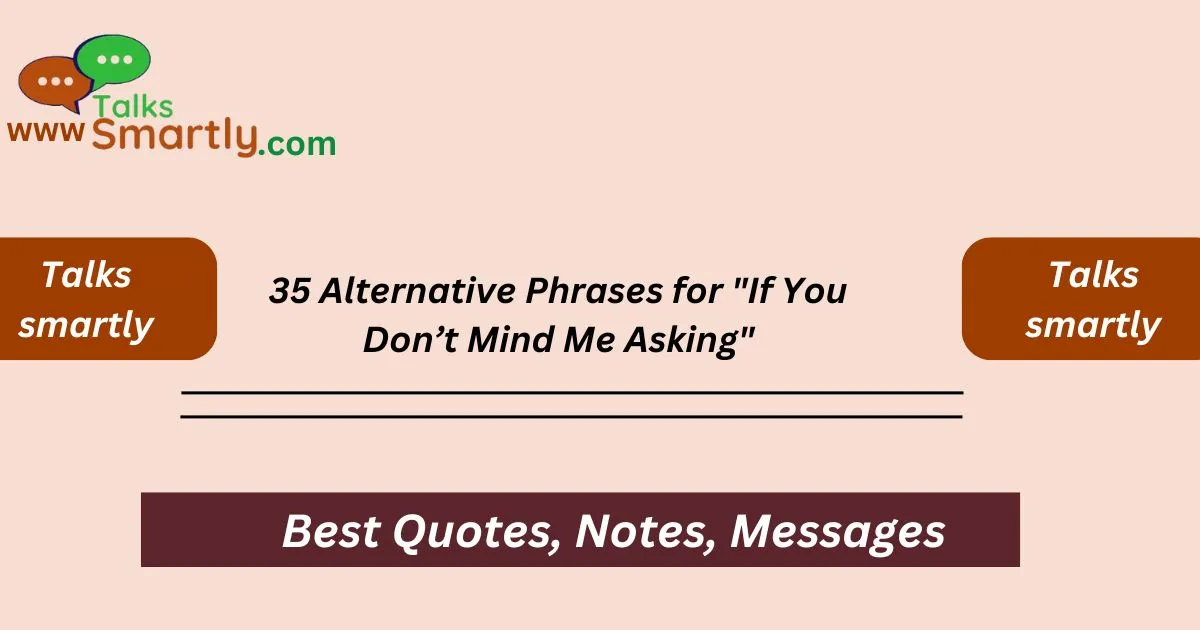“Alternative ways to politely ask a question without using the phrase “If You Don’t Mind Me Asking.”
In conversations, asking questions politely can make all the difference in how you’re perceived. “If you don’t mind me asking” is a common way to introduce a sensitive or personal question, but using it too often can feel repetitive.
To keep your communication fresh and courteous, it’s helpful to have alternative phrases at your disposal. In this blog, we’ll explore 35 different ways to phrase “If you don’t mind me asking,” so you can express curiosity while remaining respectful and considerate of others’ boundaries.
35 Alternative Phrases for “If You Don’t Mind Me Asking”
- _May I ask? _
- _Would it be okay if I asked? _
- _Could I inquire? _
- _I hope it’s okay to ask. _
- _I hope you don’t mind me asking. _
- _If it’s alright with you, may I ask? _
- _Would it be rude of me to ask? _
- _Can I ask something, if you’re comfortable? _
- _Is it okay if I ask? _
- _I’d like to ask, if that’s alright. _
- _If you’re fine with it, may I ask? _
- _Would you mind if I asked a question? _
- _Is it alright if I ask? _
- _I was wondering if I could ask. _
- _I hope it’s not too personal, but may I ask? _
- _Could you tell me, if it’s not too much trouble? _
- _Would you be willing to answer a quick question? _
- _If it’s not inappropriate, may I ask? _
- _I’d love to know, if you’re okay with that. _
- _May I inquire about something? _
- _Could I ask for your input? _
- _Would it be acceptable for me to ask? _
- _Do you mind if I ask a quick question? _
- _If it’s not a bother, could I ask? _
- _Do you feel comfortable answering a question? _
- _Would it be alright if I inquired? _
- _Could I ask you something, with your permission? _
- _I hope you don’t mind me inquiring. _
- _If it’s not too personal, can I ask? _
- _I hope it’s not too intrusive, but may I ask? _
- _If you’re okay with it, could I ask? _
- _Would you mind if I inquired? _
- _If you’re comfortable, can I ask something? _
- _I hope it’s not rude, but could I ask? _
- _Would you be open to answering a question? _
1. May I ask?
This is a direct yet polite way to ask a question. It’s concise and respectful, suitable for both casual and formal situations.
Example: “May I ask what time the meeting starts?” This phrase works well in professional environments when seeking clarity.
2. Would it be okay if I asked?
This is a gentle and respectful phrase that gives the listener the option to decline the question.
Example: “Would it be okay if I asked how long you’ve worked here?” It’s perfect for building rapport with a new colleague.
3. Could I inquire?
A more formal variation, this phrase is typically used in professional or official settings.
Example: “Could I inquire about the status of my application?” It feels formal and respectful, making it appropriate for job-related inquiries.
4. I hope it’s okay to ask.
This phrase softens your request, implying that you are aware of personal boundaries.
Example: “I hope it’s okay to ask, but are you planning to attend the event?” It works well in casual conversations with acquaintances.

5. I hope you don’t mind me asking.
This phrase is similar to the original but slightly longer, offering more nuance and politeness.
Example: “I hope you don’t mind me asking, but how did you find the seminar?” It’s great for post-event conversations.
6. If it’s alright with you, may I ask?
A more formal way to seek permission, often used in respectful discussions.
Example: “If it’s alright with you, may I ask for your feedback on the presentation?” It shows that you value the other person’s comfort level.
7. Would it be rude of me to ask?
This phrase acknowledges that the question might be considered intrusive but frames it in a considerate way.
Example: “Would it be rude of me to ask how you managed to finish the project so quickly?” It’s useful in situations where the question may be personal.
8. Can I ask something, if you’re comfortable?
A casual phrase that shows respect for boundaries while keeping the tone light.
Example: “Can I ask something, if you’re comfortable? How did you prepare for the interview?” This works well in friendly conversations.
9. Is it okay if I ask?
A versatile phrase that can be used in both formal and informal settings to gently inquire.
Example: “Is it okay if I ask how long you’ve been working on this?” Perfect for project discussions.
10. I’d like to ask if that’s alright.
This is a polite phrase that softens your question while giving the person a choice.
Example: “I’d like to ask, if that’s alright, how you achieved those results.” Great for professional environments.
11. If you’re fine with it, may I ask?
This phrase seeks permission in a soft, considerate manner. It offers the other person an opportunity to decline without pressure.
Example: “If you’re fine with it, may I ask how you managed to solve the issue?” This works well when discussing achievements or sensitive topics.
12. Would you mind if I asked a question?
A classic polite inquiry, asking whether the person is okay with you proceeding with your question.
Example: “Would you mind if I asked a question about your recent project?” It’s useful in professional meetings to show respect.
13. Is it alright if I ask?
This phrase is neutral and polite, offering a respectful way to engage with someone’s boundaries.
Example: “Is it alright if I ask how you found that resource?” Great for casual conversations where you’re unsure if the question is appropriate.
14. I was wondering if I could ask.
A friendly and informal phrase that makes your question sound curious and considerate.
Example: “I was wondering if I could ask how long it took you to write that report?” This works well in casual settings with colleagues or friends.
Alternative Phrases for “Don’t Miss Me Too Much”
15. I hope it’s not too personal, but may I ask?
This is great for when your question could be perceived as intrusive, and it softens your request.
Example: “I hope it’s not too personal, but may I ask how you managed that negotiation?” Ideal for asking about sensitive or personal achievements.
16. Could you tell me, if it’s not too much trouble?
This phrase shows that you’re aware you’re asking for a favor and want to ensure it’s not inconvenient.
Example: “Could you tell me, if it’s not too much trouble, how you conducted that analysis?” It’s respectful in a professional setting.
17. Would you be willing to answer a quick question?
A direct but polite way to ask a question, implying that you won’t take up much of the person’s time.
Example: “Would you be willing to answer a quick question about your presentation?” This is perfect for short queries in busy environments.
18. If it’s not inappropriate, may I ask?
This is a more formal phrase, often used when you’re unsure whether the topic is entirely appropriate.
Example: “If it’s not inappropriate, may I ask about the challenges you faced in that role?” This works for sensitive professional matters.
19. I’d love to know, if you’re okay with that.
This phrase expresses genuine curiosity while still respecting the other person’s boundaries.
Example: “I’d love to know, if you’re okay with that, how you prepared for the final exam?” Great for casual conversations with friends.
20. May I inquire about something?
A formal phrase that is perfect for professional settings, showing politeness and respect.
Example: “May I inquire about something regarding the budget allocation?” It works well in official or business settings.
21. Could I ask for your input?
This phrase shows that you value the other person’s opinion and seek their advice in a polite manner.
Example: “Could I ask for your input on this project before we submit it?” It’s perfect in collaborative work environments.
22. Would it be acceptable for me to ask?
A formal and polite way to seek permission before asking a question, making it suitable for business settings.
Example: “Would it be acceptable for me to ask about the timeline for the project?” It’s ideal for professional and formal settings.
23. Do you mind if I ask a quick question?
This is a casual and respectful way to ask something without being too intrusive.
Example: “Do you mind if I ask a quick question about your research?” It’s a useful phrase when you need brief clarification.
24. If it’s not a bother, could I ask?
This phrase shows that you’re conscious of the other person’s time and are polite in your request.
Example: “If it’s not a bother, could I ask how you organized that event?” It’s great for casual but respectful inquiries.
25. Do you feel comfortable answering a question?
A considerate phrase that ensures the person feels at ease before responding to your question.
Example: “Do you feel comfortable answering a question about your decision-making process?” This is ideal when discussing sensitive topics.
26. Would it be alright if I inquired?
A formal and respectful phrase to use when you’re looking to ask something delicate or professional.
Example: “Would it be alright if I inquired about the feedback we received from the client?” It’s great for professional settings.
27. Could I ask you something, with your permission?
This phrase emphasizes the importance of permission before proceeding with the question.
Example: “Could I ask you something, with your permission, regarding the upcoming event?” It works well in business or formal conversations.
28. I hope you don’t mind me inquiring.
A soft way to introduce a question, showing that you’re considerate of the person’s feelings.
Example: “I hope you don’t mind me inquiring, but could you explain your approach to problem-solving?” It’s great for casual yet respectful conversations.
29. If it’s not too personal, can I ask?
This phrase works when you’re aware your question might touch on something personal, offering the person an easy way out.
Example: “If it’s not too personal, can I ask how you dealt with that situation?” Ideal for one-on-one discussions.

30. I hope it’s not too intrusive, but may I ask?
This is a polite phrase used to acknowledge boundaries before asking a potentially invasive question.
Example: “I hope it’s not too intrusive, but may I ask how you handled the disagreement?” It’s perfect for professional or personal topics.
31. If you’re okay with it, could I ask?
This phrase checks if the other person is comfortable before asking a question, softening the inquiry.
Example: “If you’re okay with it, could I ask how you structured your proposal?” It’s useful in both formal and informal conversations.
32. Would you mind if I inquired?
A polite phrase often used in professional settings to ensure you’re not overstepping boundaries.
Example: “Would you mind if I inquired about your previous experience with the system?” It’s great for technical or professional discussions.
33. If you’re comfortable, can I ask something?
A friendly, casual phrase that puts the other person’s comfort first.
Example: “If you’re comfortable, can I ask something about your recent trip?” Perfect for lighthearted conversations among friends.
34. I hope it’s not rude, but could I ask?
This phrase prepares the listener for a potentially personal question, giving them the option to decline.
Example: “I hope it’s not rude, but could I ask how you manage such a busy schedule?” It’s useful when discussing personal topics.
35. Would you be open to answering a question?
A considerate and neutral way to request information, keeping the person’s comfort in mind.
Example: “Would you be open to answering a question about the budget cuts?” It works well in professional settings where sensitivity is required.
ANSWER TO KEY QUESTION
1. Why should I use alternative phrases to “If you don’t mind me asking”?
Using a variety of phrases helps you avoid repetition and sound more thoughtful and considerate.
2. Can I use these phrases in formal emails?
Yes, many of these alternatives are suitable for both written and spoken communication in formal contexts.
3. Are these phrases polite enough for sensitive questions?
Absolutely. Each phrase is designed to show politeness and respect when asking delicate questions.
4. Which phrase works best for casual conversations?
Phrases like “May I ask?” or “I hope it’s okay to ask” work well in casual settings with friends or colleagues.
5. How do I know which phrase to use in professional settings?
More formal phrases, such as “May I inquire?” or “Would it be acceptable if I asked?” are ideal for professional environments.
Conclusion
Politeness and respect are essential when asking questions, especially when discussing sensitive or personal topics. By using these 35 alternative phrases to “If you don’t mind me asking,” you can ensure your conversations remain respectful and considerate. Whether in a casual chat or a formal meeting, these phrases will help you ask questions tactfully and thoughtfully.












